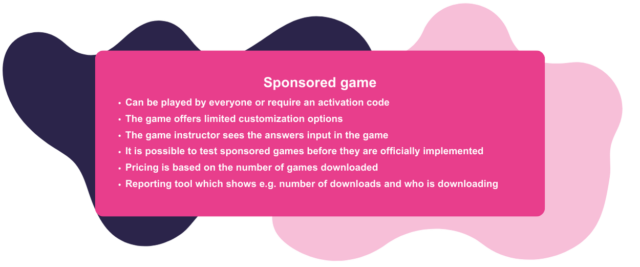Seppo In The Toolbox Of Goethe-Institut Finnland
Head of Language Department, Deputy Director
Seppo In The Toolbox Of Goethe-Institut Finnland
Goethe-Institut Finnland is a cultural institute in Helsinki, which promotes the German language and culture. They are long-time Seppo users, who first started using Seppo with the aim to make the German language and culture familiar to young people in an interesting and modern way. In the first game created by the institute, players adventure around East-Pasila and familiarise themselves with street art in German.
Goethe-Institut Finnland participated in the Street Art Pasila project organised in 2017-2018, in which artists from around the world arrived at the East Pasila blocks to create their pieces of art around the neighbourhood. The project was born out of the cooperation between the EUNIC network and national cultural institutes.
The Goethe-Institut produced videos of interviews with German-speaking artists and wanted to utilise the videos in the form of a game. The German teachers working with the institute tipped off those working on the project about the Seppo platform, and eventually, the Goethe-Institut adopted Seppo. The first game to be created was the Pasila Street Art game.
Entertaining content for learning
In the Pasila Street Art game, players adventure around East-Pasila while using the German language. Two different versions of the game have been made; one for A1 and A2 level language learners and a second for B1 level learners.
The game includes various tasks, such as traditional hearing comprehension exercises and orienteering-type tasks in which the players have to look for works and describe them. The tasks may also include creating a personal piece of art.
“With the Pasila game, we wanted to provide different dimensions to German language studies – something different from classroom studies, books, and grammar. You can also learn in a fun way and with entertaining content. In the game, we wanted to encourage students to leave the classroom and go outside,” says Ulrike Eichstädt, Head of the Language Department and Deputy Director at Goethe-Institut Finnland.
However, the Pasila game can be played also elsewhere than in Pasila, so students around Finland could also play the game in the local municipality. The Pasila game is a so-called sponsored game, which can be accessed with a code shared with the teachers.

Read more about Seppo’s sponsored games in MLL’s story! [MLL’s story]
The PASCH Day event’s outdoor game was a success
The PASCH Day event, in which students and teachers from the PASCH partner network schools participate in a joint event, which presents the German language and culture, is annually organised in Helsinki. The organisers include the Goethe-Institut, the Embassy of Germany, and Zentralstelle für das Auslandsschulwesen, an umbrella organisation of German schools operating abroad. Participants include, for example, the Embassy of Austria and various German companies operating in Finland.
In 2022, the PASCH Day event utilised Seppo to facilitate familiarisation with German language-promoting entities in Helsinki. There were different checkpoints at the Goethe-Institut, Helsinki German School, the Embassy of Austria, the University of Helsinki, and the Helsinki German Library.
“During the PASCH Day event’s game, the students ran around Helsinki and collected the game answers to Seppo. Overall, the game was extremely successful, and the event was highly enjoyed. Each entity that had participated in organising the game provided us with tasks, and we added them to the Seppo game. Goethe-Institut operated as the game leader,” describes Eichstädt.
Seppo games as a more integral part of German teaching at the institute
Seppo games are currently also in use at the Goethe-Institut Library, where the game works as a guide to the library. In addition, the plan is to introduce games as part of teaching in the independent German education organised by the institute. Goethe-Institut offers a wide selection of German language courses to students of different levels and ages.
Goethe-Institut also aims to promote the choice of German as a language option in schools before the students make the language choices. The institute has had its own game for this purpose and now wants to reform it.
“We have previously used a traditional “analog” game, which we have taken with us to school visits where we have told about German culture. The game has various tasks and exercises. We aim to create a similar game now, however, digitally and using the Seppo platform. It shall be a hybrid version, including a few elements from the previous game,” explains Eichstädt.
Seppo is praised for its rapid user support
Ulrike Eichstädt praises Seppo for the provided training and user support, which the institute has utilised from the very beginning.
“We received good and thorough help and tips at the very start on how to develop a game. The use of Seppo has worked very well, and we are satisfied with it. We continue to receive help with the games very quickly. Once, an answer even arrived during the weekend when I had problems with a game-specific matter. This was a delightful surprise!”